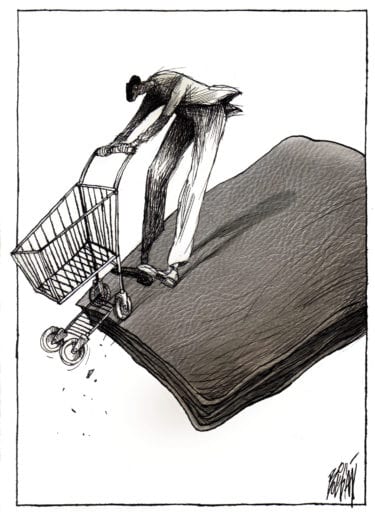In my late teens and early 20s, in between immersions in Edmund Spenser, I jumped with full force and fervor into the world of Fyodor Dostoevsky. Along with probing insights into the human condition, most of Dostoevsky’s great novels contained a character suffering [and doomed] with “consumption.”
Consumption was the common 19th century name for tuberculosis, so designated because the disease seemed to consume its victims’ bodies from the inside out. It cast a pall over much 19th century art. Violetta in “La Traviata” and Mimi in “La Boheme” both succumb to the disease in operatic fashion – and in echo of the real women they were based on.
One of the great novels of the last century was Thomas Mann’s The Magic Mountain, set in an Alpine tuberculosis sanitarium just prior to World War I.
It wasn’t until 1943, that streptomycin first became a valid treatment for the disease. Nearly 40 years ago, I worked with a retired professor who had spent part of his youth at the Jewish Consumptive Relief Society sanitarium in Denver, famous in its day. [It’s doubtful that anyone would be sent to the Front Range for respiratory troubles these days.]
But today we are concerned with another form of consumptivitis – the epidemic of over-consumption. A constant barrage of advertisements tells us that it is our responsibility, our only calling in life to buy things, more and more things. And the result of this sickness?
Northwestern Mutual’s 2018 Planning and Progress Study reports that the average American carries about $38,000 in personal debt, not counting home mortgages, according to Business Insider. Furthermore, “fewer people said they carry “no debt” this year compared to 2017 [23% vs. 27%].”
The Huffington Post ran an article over Thanksgiving weekend about “buying-shopping disorder,” which some therapists think should be classified as a mental illness. But if individuals can become addicted, what about entire countries?
My musical interests of late have rotated between the wonderful, but woeful, songwriter Townes Van Zandt – who finally received proper recognition in Ken Burns’ documentary on country music – and the pure joy of the Sant Andreu Jazz Band of Barcelona and the continued adventures of former members.
One recent evening, as a hype for Black Friday, the between-song advertisement on YouTube was a spot for a company whose sole purpose is to encourage more spending. And the ad itself was an alleged news story by a business reporter for a major network. That’s right, the nearly two-minute “news story” was such an endorsement that the company was running it straight up as an ad. Now, there’s “fake news” for you.
Got to go buy-buy.
Which brings me to one of my philosophical mentors, John Dewey, who, writing in 1930, wondered [and I’ll supply journalistic paragraphing]:
“What has become of the old-fashioned ideal of thrift? … Speeded-up mass production demands increased buying. It is promoted by advertising on a vast scale, by installment selling, by agents skilled in breaking down sales resistance. Hence, buying becomes an economic ‘duty’ which is as consonant with the present epoch as thrift was with the period of individualism.
“For the industrial mechanism depends upon maintaining some kind of an equilibrium between production and consumption. If the equilibrium is disturbed, the whole social structure is affected and prosperity ceases to have a meaning.”
That was Dewey’s assessment 90 years ago. The situation has only worsened, but give him credit for his prescience:
“The old plea for ‘sacrifice’ loses its force. In effect, the individual is told that by indulging in the enjoyment of free purchasing he performs his economic duty, transferring his surplus income to the corporate store where it can be most effectively used. Virtue departs from mere thrift.”
America’s greed creed has swept much of the world. Black Friday is now an event in Europe.
Spain.info reports: “This craze of offering discounts on the last Friday in November has now totally established itself in Spain … The one day of the year you need to shop till you drop.”
Or not.
Some of our French friends took to the streets on Black Friday to protest the media-induced spending frenzy. One of their targets was Amazon, as a destroyer of brick and mortar stores and the communities they anchor.
[My sister – we’re Baby Boomers – has observed that, growing up, our parents and grandparents ordered their special goods from catalogs. We and the next bunch had mega-malls for shopping and hanging out. Now, the economy is becoming mail order again.]
But we don’t have to protest against consumptivitis.
On the day before Black Friday, one of those Barcelona jazzers, Andrea Motis [singer, songwriter and sax player, who considers the trumpet her first love], announced on Facebook: “Tomorrow I will face the day with serenity. I won’t invest time or money in buying, because I don’t need anything. This is the feeling we all want and we can all get more easily than it seems. 🙂 Have a very good day!”
So, along with getting the best jazz training on the planet, the young musicians at SAJB also seem to receive instructions in social awareness.
We could join that great fictional philosopher Frank Costanza – the originator of “Festivus for the rest of us” – and intone his other mantra: “Serenity now.”
Or just realize, as couple of blokes from my generation once observed, “Money can’t buy me love.”







